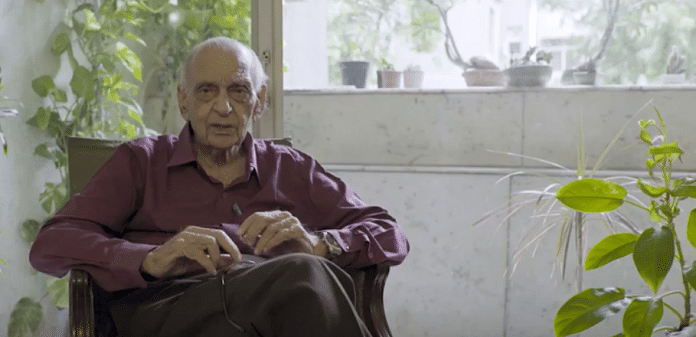New Delhi: Curious queries about sex and his unusually frank replies got Dr Mahinder Watsa, one of Mumbai’s most popular ‘sexpert’ and a trained obstetrician-gynecologist, a cult following.
Dr Watsa, who died Monday at the age of 96, was hugely popular for his daily column ‘Ask The Sexpert’ in the Mumbai Mirror, where he would tackle readers’ queries with humour and sensitivity.
“Dad was a man of many dimensions. He lived a glorious life and on his terms. Today, we would like to celebrate his life as he has passed on to join his beloved [wife] Promila,” read an official statement issued by his children Monday.
Born in Calcutta in 1924, Watsa’s father was a medical researcher with the British Army. Because of his father’s postings, he grew up in several places across India. Watsa began his career as a columnist in his late 30s, after finishing his medical education.
While he was working as a consultant for the Family Planning Association of India (FPAI) in 1974, Watsa had proposed that a sexual counselling and education programme be introduced in India, a rather uncharted field at the time. His proposal was accepted and India’s first sex education, counselling, and therapy centre was started by the FPAI.
“Reactions to this went through the entire spectrum from open hostility, derision, contempt and ridicule, to curiosity, interest, tolerance and reluctant acceptance, and finally to enthusiastic participation,” Watsa wrote in 2004.
In an interview to the BBC, Watsa recalled a key moment that shaped his thinking. During a 1957 meeting of the Congress of Planned Parenthood, he met a Japanese doctor who explained how he had saved girls from killing themselves after getting pregnant.
“The popular suicide spot was around the corner of a hillside on a train track, where the driver couldn’t see. The doctor put up posters on the hill saying there was no need to die, he could help. He did abortions, you see. He saved a number of people’s lives. I was very impressed,” Dr Watsa said.
Also read: How urban planning can make Indian cities more inclusive for women
‘Consent, consent and consent’
In 1976, Dr Watsa organised India’s first ever workshop on Human Sexuality and Family Life. He had put an ad in the newspapers calling people from different backgrounds — doctors, social scientists, counsellors, and journalists — to attend it.
One of them was gay-rights activist Ashok Row Kavi, who was invited “under the cover of being a journalist” to speak on homosexuality.
“He (Watsa) gave me free rein — but a lot of people at that meeting were horrified. The meeting broke all sorts of new ground, discussing for example how male sexual behaviour outside marriage could be a vector for sexually transmitted diseases among women, and how there was no point in treating one partner unless all partners were treated,” Kavi recalled.
Watsa started writing the famous ‘Ask the Sexpert’ column for Mumbai Mirror when he was 80. The column grew hugely popular among Indian households, where sex is largely treated as a taboo subject.
Meena Baghel, the editor-in-chief of the daily, recalled how Watsa would have answered an estimated 20,000 queries so far. Baghel also wrote that if there was one sex advice Dr Watsa would insist on, it was “consent, consent and consent”.
Celebrities, including actor Kalki Koechlin, comedian Rohan Joshi and Vir Das, paid their tributes to Watsa.
Also read: What’s chemical castration — the punishment Pakistan plans to introduce for sex crimes



